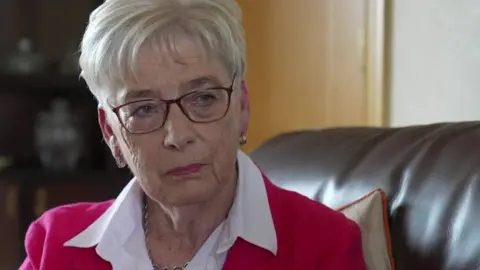Troubles legacy: MPs vote to keep immunity measure in Troubles bill
 BBC
BBCA bid to prevent immunity from prosecution being offered to those who cooperate with Troubles investigations has been rejected in the Commons.
MPs voted to retain the measure within the government's controversial legacy bill, which is progressing through Parliament.
They voted 273 to 205.
Ahead of the debate earlier, the widow of a farmer murdered by the IRA warned the government not to "trample" on victims.
The bill offers an amnesty to those accused of killings and other Troubles-related crimes.
The Democratic Unionist Party (DUP), Alliance, SDLP and other opposition parties argued it represented a "corruption of justice".
But Northern Ireland minister Conor Burns said the legislation was a "compromise" to address the past.
The debate came almost to the day that Iris Moffit-Scott would mark the 39th anniversary of her husband Malvern's murder.
He was shot in his tractor in 1983.
No one has ever been convicted of the murder of the 36-year-old father-of-four, who was cutting hedges near Omagh at the time.
The killing was blamed on the IRA.
"That day Malvern put my youngest son on the bus for his first day at school and he never saw his daddy alive again," said Mrs Mofitt Scott.
"He was a 36-year-old farmer doing a day's work when he was murdered by republican terrorists.
"Those brave men who shot an unarmed civilian in the back, never had the courage to admit to the murder."
Separately, the government accepted a Labour and DUP amendment to exclude those who committed sexual offences during the Troubles from gaining amnesty from prosecution.
Labour, local MPs and some Conservatives argued that sexual violence was used as a method of intimidation - and people who had carried out rapes should not be granted amnesty.
Mr Burns said Number 10 had heard "loud and clear" the views of other parties on that particular point.
He said it would require further clarity ahead of the next stage of the bill, due to take place next week.
MPs also rejected a DUP amendment to prevent the granting of immunity to anyone who had moved abroad to avoid prosecution after being arrested or charged with an offence.
Ahead of the debate, Mrs Moffitt-Scott said victims across Northern Ireland were not even an "after thought" for the government.
"I would ask the British government to put victims where they should be and don't trample on them and don't treat them differently than victims of terrorism in any other British city," she said.
"I would invite Boris Johnson to look at my children and grandchildren in the eye to see the impact and the suffering of putting terrorists before victims."


The government has stated that current legacy arrangements are not working.
However, by coincidence on the day it is advancing legislation, come two court outcomes which, in the view of opponents, undermine its argument.
It wants to ban all future inquests and civil actions related to the Troubles.
Today, some victims' families found huge merit in having their day in court.
In the case of Kathleen Thompson, an inquest found a soldier was not justified in shooting her.
The other case was a civil action by relatives of those murdered in the McGurks Bar bombing.
They had a police report quashed by a judge.
But what happened today is not going to change the bigger picture.
The government has embarked upon a course of action which it is highly unlikely to deviate from.

Mrs Moffitt-Scott also said the focus should remain on the lack of truth coming from the IRA and Sinn Féin about what happened during the Troubles.
Meanwhile, the niece of a Belfast school girl who died after being hit by a plastic bullet fired by a soldier also criticised the government's Troubles bill.
Charlotte McCurry, who's aunt Julie Livingstone was killed in 1981 at the age of 14, said "truth and justice" were vital for reconciliation and to allow people to move forward.
"No victims support this and I don't think anybody wants an amnesty for those who were involved in murder during the Troubles," she said.

Ms McCurry said her family had given up hope of ever getting justice, but she said files on the case have been locked by the government until 2064, which she said was unacceptable.
"By then my aunt's brother and sisters will no longer be around, but we are determined to carry on the fight for Julie," she said.

Ms McCurry joined a number of other relatives of victims at Westminster on Tuesday night for a production of victims' testimony.
It was hosted by the SDLP leader Colum Eastwood.
"We felt it was important to let MPs hear at first hand about the victims and how their families have suffered in the hope it may influence how they vote on this bill" explained Ms McCurry.
